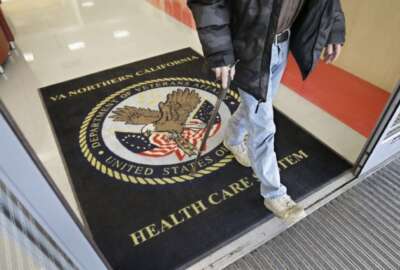Veterans Affairs hopes non-human entity can help keep tabs on patients
A mobile and interactive service known as “Annie” is being deployed nationwide to help vets keep up with their healthcare protocols via text message.
Instead of asking Annie if she is okay, what if Annie asked you? That is the case now for veterans receiving treatment from the VA. The mobile and interactive service known as “Annie” is being deployed nationwide to help vets keep up with their healthcare protocols via text message. The service, created by Accenture, has gotten a lot of positive feedback. To learn more, Federal News Network’s Eric White talked with Dr. Ron Moody, Chief Medical Officer for Accenture Federal Services.
Interview Transcript:
Eric White Instead of asking Annie if she’s okay, what if Annie asked you? That’s the case now for veterans receiving treatment from the VA. The mobile and interactive service known as Annie is being deployed nationwide now to help vets keep up with their health care protocols via text message. The service, created by Accenture, has gotten a lot of positive feedback. To learn more, we welcome Dr. Ron Moody, chief medical officer for Accenture Federal Services. Dr. Moody, thanks for taking the time.
Ron Moody I appreciate you having us and having an opportunity to discuss Annie today.
Eric White Yeah, so first question, why Annie? Is Annie a love lost in your past, or what’s the story there?
Ron Moody [It’s named after a nurse named Annie Fox.] But why Annie, right? I mean, we have a problem in healthcare. You know, U.S. health care costs have been high. Getting engagement to people has been difficult, improving quality, you know we have a doctor and nurses shortage. So we have to find new ways of doing things. And I have called the VA and their anywhere to anywhere care. They’ve had videos, just last week did over a million video visits. But Annie is a way to engage people in their home in new ways of being addressing the problems that have come up for not only sicker population, but with the veteran with the VA having the PACT Act, making more veterans eligible, as well as the Mission Act for veterans have more access to care. This gives a way for the VA to be a companion in interacting with veterans on a continual basis to improve health care. So eventually, you know, it’d get to the point where we don’t have not enough doctors or nurses, we have a better way of delivering health care.
Eric White All right, so let’s get into how the service actually works. It kind of nudges those in care of the Veterans Affairs department to make sure that they’re keeping up with their health protocols. What does that mean? And yeah, how does Annie do that?
Ron Moody Right, so Annie was a project the VA started several years ago, and simply stated, she’s a protocol-based text messaging system. So that basically means she responds, the VA can create protocols, or what in sometimes might be considered care plans, for veterans to be engaged. They get a message from Annie, which can then remind them to do something such as with diabetes to send in their blood glucose. And they would text back … right? So it does several things. It engages them with cognitive and behavioral practices to have them engaged and to remember what they’re doing. So, much more engaging than simply monitoring you. It gives the VA an opportunity to remind people about everything from preventive health services to preparing for procedures, such as the recent colonoscopy study, which showed that improving that ability for that services to be delivered. It can do administrative things also. So the VA can create any protocol based upon a health or administrative need, and then be engaging that veteran continuously. So, the good news is, it can really assist the veteran and be their companion from one place to the other. The studies are showing that often, right, you’ve made the joke, but oftentimes the veterans are perceiving Annie as a real person, because she’s regular, she’s consistent with them. The messages that we’ve worked with the Office of Connected Care to VA are tailored to veterans need to keep them engaged. And these protocol-based messaging systems have been shown in across demographics and across countries to improve medication adherence, to decrease readmission to the hospital, and do a whole host of other benefits. So, evidence-based, low cost, using the most common form of communication on the planet almost, at least if you watch my my grandkids sit around the table, they’re texting and they’re not talking.
Eric White We’re speaking with Dr. Ron Moody. He is the chief medical officer for Accenture Federal Services. And yeah, on that technology side, I know you’re a medical doctor, but can you just give us the basic overview of how this technology works? Is it just something that the veterans automatically sign up for when they receive care, or is it something they’ve got to jump on voluntarily?
Ron Moody Oh, great, great question. So Annie uses a, so first the technology behind it, Annie uses a combination of government software and commercial software. It’s using just the Twilio platform for SMS text dialing out to the veteran has that machine. That’s the same way that veterans receive text. We have a very, very awesome program. I’m a veteran myself. To give people appointment reminders through that text, and so that veterans are used to receiving that. For Annie, right, they have to do two things. They can self they can self enroll into Annie using the Annie web app that comes in both a web app, or you can just engage by text. But clinical staff typically register the patient into Annie. They then taken and can assign them a protocol. The veteran could self subscribe to a protocol and that’s a protocol of interest to them or needed for their care. And then Annie would start messaging them with some frequency and those messages can vary, everything from, as we were talking about earlier with blood glucose, to it could be helping with post-hospitalization reminders, procedural type preparation, preventive services, and it can remember your birthday card, and remember your birthday and send you a reminder on your birthday. And although that may sound why would you want to do that, but it’s about engagement, right? Annie as a platform is really about communication, collaboration. And health care is about communication, collaboration and trust. And what the VA has really been invested in, right, and we’ve been supporting them, is that ability to create an extended, trusted health care network to be able to really engage veterans, anywhere they are, anytime. Annie is just one of the tools in that arsenal, to be able to help them do things differently, and to lessen the burden on both the health care system, but more importantly, on that patient having to come to a clinic. You know, the other big thing recently, people talk a lot about remote patient monitoring. Think about Annie as remote patient support device, right? You can text, you can ask them how they’re doing. That’s occurring without human being in the loop until a human needs to be involved.
Eric White Yeah, on that experience side, you’ve gotten positive feedback from the patients who did use this. I’ll be honest, in this modern world, sometimes I sign up for stuff and nine text messages later, I go, why did I sign up for this and how do I get out of this? How do you maintain that balance when it comes to public health engagement? Because, you know, nobody wants to be nitpicked to death.
Ron Moody Oh, absolutely. So, in tailored messaging and marketing, and essentially what happens to be a technology company is one of the world’s largest marketing companies. So if you look at how people respond to text, what they want to respond to, again, I don’t need that 17 barrages of messages, I should be able to select what I want. It starts with a trusted relationship, you know, not just that vendor, sending me, you know, 17 reminders that they have something to sell. But this is your health care system engaging and then becoming what Annie becomes, and although it has a name, the studies show that it becomes a relationship that people have. Annie can be become anything from your old drill sergeant, to your teacher back in school, to your grandmother. Being that person that nudges a reminder to you like you want. So the engagement is almost self sustaining, in part because it’s value add. And I think that’s some of the times what some organizations who go into health IT miss, right? It’s just not about communication. It’s communication, collaboration, trust.
Eric White What does the future look like for Annie? Is this going to be nationwide and become a staple for VA?
Ron Moody Yeah, so Annie has been out for a while she’s been getting increasing usage in the VA. There’s just over, I think, if my numbers are correct, it’s just over 250,000 veterans who are actively enrolled in Annie as users and about a quarter those are currently on protocols. It’s getting expanded use now that people are searching the evidence come from that. And as you mentioned earlier, people, both the staff, health care has got to change and veterans have to come around. I believe you’re going to see Annie because of its very nature, right? It’s a way to provide health care at low cost, across bandwidth, give equitable health care so no matter where a veteran is, or what their bandwidth, most of us can receive a text. And so you’ll see more of that engagement across the continuum. And Annie will move to involve now, it’s, it is not an AI-based system. Doesn’t need to become an AI. It’s not meant to be a chatbot. It’s meant to be very specific, scientific-based protocols, the tailored messaging, but it can be improved, and that’ll happen. AI will allow it to be multilingual and other things, while maintaining the value that it has. And I see it only expanding across the VA services, used in multiple lines. Again, everything from the Veterans Health Administration where it’s currently mainly used, but it could be extended over to help with, assist with things and Veteran Benefits Association, reminding people about the status of of their benefits. Where their things are in process, actions they need to take. So, a lot of utility, she’s versatile, and she’s valuable. And I look forward to seeing her continued use for all my fellow veterans out there, because again, proven ways to improve health care and health engagement.
Eric White Dr. Ron Moody is chief medical officer for Accenture Federal Service, thank you so much for joining me.
Copyright © 2025 Federal News Network. All rights reserved. This website is not intended for users located within the European Economic Area.
Eric White is news anchor and Federal Drive producer at Federal News Network.
Follow @FEDERALNEWSCAST






